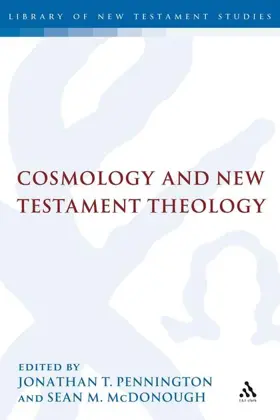

Cosmology and New Testament Theology
in Library of New Testament Studies
Pages
224
Publisher
T&T Clark
Published
7/22/2008
ISBN-13
9780567031433
For first-century people, cosmology was a fundamental part of their worldview. Whether it was the philosopher contemplating the perfection of the heavenly orbits, the farmer searching the sky for signs of when to plant his crops, or the desert-dwelling sectarian looking for the end of the world, the cosmos held an endless fascination and occupied a prominent place in their understanding of life.
For most ancient peoples, cosmology and theology were inseparable. Thus, when the Jewish and Christian Scriptural traditions begin with the bold claim, "In the beginning God created the heavens and earth," these words make statements which are at once cosmogonic, cosmological, and theological.
Scholarship has begun only recently to investigate more fully the various cosmological and cosmogonic traditions that were current in the time of the Old and New Testaments. Much of this work, however, has focused on how OT conceptions of the world compared to other Ancient Near Eastern traditions. Much less has been done on the cosmological traditions which stand behind the views of the NT writers. Even fewer works have sought to connect cosmological views with NT theology. In light of the great importance that cosmology had in ancient peoples' worldviews and theological understanding, a thorough investigation of this neglected topic is in order.
Cosmology and New Testament Theology systematically examines the NT documents to show how cosmological language and concepts inform, interact with, and contribute to the specific theological emphases of the various NT books. In some NT books, the importance of cosmology can be easily discerned, while in others what is required is a new and close examination of key cosmological terms (e.g., heaven, earth, world, creation) with an eye to the themes and theology of the book.
For most ancient peoples, cosmology and theology were inseparable. Thus, when the Jewish and Christian Scriptural traditions begin with the bold claim, "In the beginning God created the heavens and earth," these words make statements which are at once cosmogonic, cosmological, and theological.
Scholarship has begun only recently to investigate more fully the various cosmological and cosmogonic traditions that were current in the time of the Old and New Testaments. Much of this work, however, has focused on how OT conceptions of the world compared to other Ancient Near Eastern traditions. Much less has been done on the cosmological traditions which stand behind the views of the NT writers. Even fewer works have sought to connect cosmological views with NT theology. In light of the great importance that cosmology had in ancient peoples' worldviews and theological understanding, a thorough investigation of this neglected topic is in order.
Cosmology and New Testament Theology systematically examines the NT documents to show how cosmological language and concepts inform, interact with, and contribute to the specific theological emphases of the various NT books. In some NT books, the importance of cosmology can be easily discerned, while in others what is required is a new and close examination of key cosmological terms (e.g., heaven, earth, world, creation) with an eye to the themes and theology of the book.
- Table of Contents
- List of Contributors
- Introduction - Sean M. McDonough; Jonathan T. Pennington
- 1. Graeco-Roman and Ancient Jewish Cosmology - Edward Adams
- 2. Heaven, Earth, and a New Genesis: Theological Cosmology in Matthew - Jonathan T. Pennington
- 3. Tearing the Heavens and Shaking the Heavenlies: Mark's Cosmology in its Apocalyptic Context - Michael F. Bird
- 4. 'The Heavens Opened': Cosmological and Theological Transformation in Luke and Acts - Steve Walton
- 5. Light of the World: Cosmology and the Johannine Literature - Edward W. Klink III
- 6. Paul's Cosmology: The Witness of Romans, 1 and 2 Corinthians, and Galatians - Joel White
- 7. Reoriented to the Cosmos: Cosmology & Theology in Ephesians through Philemon - Robert L. Foster
- 8. The Cosmology of Hebrews - John Laansma
- 9. God and 'the World': Cosmology and Theology in the Letter of James - Darian Lockett
- 10. Cosmology in the Petrine Literature and Jude - John Dennis
- 11. Revelation: The Climax of Cosmology - Sean M. McDonough
- 12. Conclusion - Sean M. McDonough and Jonathan T. Pennington
- Index
Inner Books
This physical volume has several internal sections, each of which has been reviewed independently
- Introduction by Sean M. McDonough and Jonathan T. Pennington
- Graeco-Roman and Ancient Jewish Cosmology by Edward Adams
- Heaven, Earth, and a New Genesis: Theological Cosmology in Matthew by Jonathan T. Pennington
- Tearing the Heavens and Shaking the Heavenlies: Mark's Cosmology in its Apocalyptic Context by Michael F. Bird
- 'The Heavens Opened': Cosmological and Theological Transformation in Luke and Acts by Steve John Walton
- Light of the World: Cosmology and the Johannine Literature by Edward W. Klink, III
- Paul's Cosmology: The Witness of Romans, 1 and 2 Corinthians, and Galatians by Joel White
- Reoriented to the Cosmos: Cosmology & Theology in Ephesians through Philemon by Robert L. Foster
- The Cosmology of Hebrews by Jon C. Laansma
- God and 'the World': Cosmology and Theology in the Letter of James by Darian R. Lockett
- Cosmology in the Petrine Literature and Jude by John Dennis
- Revelation: The Climax of Cosmology by Sean M. McDonough
- Conclusion by Sean M. McDonough and Jonathan T. Pennington